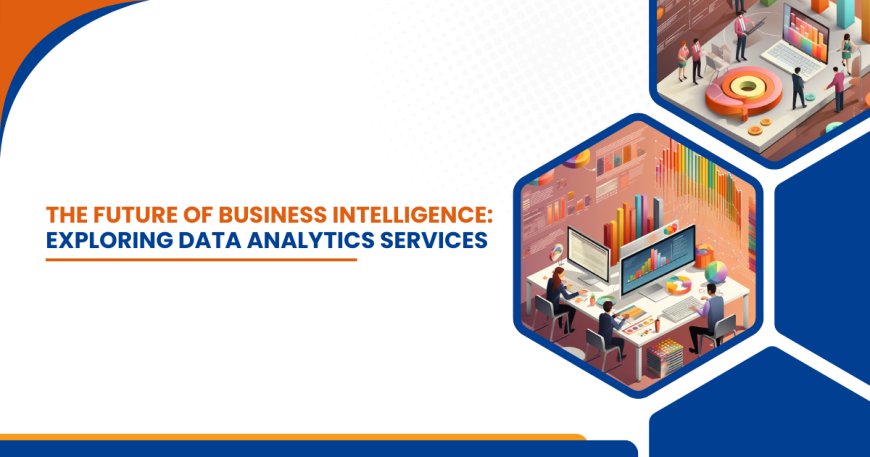The Future of Business Intelligence: Exploring Data Analytics Services
Discover the future of business intelligence and data analytics services. Learn how data-driven insights are transforming businesses for better decision-making.

As businesses adapt to the ever-evolving digital landscape, data analytics services have become integral in shaping their success. According to recent studies, the global data analytics market is projected to reach $550 billion by 2030, growing at a compound annual growth rate (CAGR) of over 13%. Additionally, companies leveraging data analytics are 5 times more likely to make faster decisions and 3 times more likely to improve customer experiences.
What Are Data Analytics Services?
Data analytics services refer to the practice of using various tools, algorithms, and techniques to collect, analyze, and interpret large volumes of data. These services help organizations extract meaningful insights from raw data, which can be used to make data-driven decisions. By leveraging these services, businesses can uncover trends, predict outcomes, and make informed choices to enhance performance.
Types of Data Analytics Services
There are several types of data analytics services, including:
-
Descriptive Analytics: This type of analysis helps businesses understand past trends by analyzing historical data. It focuses on summarizing data to identify patterns and trends.
-
Predictive Analytics: Predictive analytics uses historical data and statistical algorithms to forecast future outcomes. It enables businesses to anticipate changes and trends.
-
Prescriptive Analytics: This form of analytics suggests the best course of action based on data analysis, helping companies optimize processes and decision-making.
-
Diagnostic Analytics: Diagnostic analytics goes deeper to understand the reasons behind certain trends or events. It focuses on identifying the cause-and-effect relationships in the data.
The Rise of Data Analytics Consulting Services
As the demand for data analytics grows, more businesses are turning to data analytics consulting services for guidance. These specialized services offer expertise in data management, advanced analytics, and the implementation of data-driven strategies. Consulting firms provide businesses with the necessary knowledge and tools to leverage data effectively.
Why Is Data Analytics Consulting Important?
-
Expertise and Experience: Data analytics consultants bring years of experience in handling complex data challenges. Their insights can help businesses make better, more informed decisions.
-
Scalability: Consulting services allow companies to scale their analytics operations based on their needs, without the need for significant in-house investments.
-
Tailored Solutions: Consultants provide custom solutions tailored to the unique requirements of each business, ensuring optimal results.
The Role of Business Intelligence in the Digital Age
In the digital age, businesses are inundated with data from various sources. However, having vast amounts of data isn't enough to stay competitive—it's about transforming this data into meaningful, actionable insights. This is where business intelligence (BI) plays a critical role. BI refers to the set of technologies, processes, and strategies used to analyze and interpret business data, helping organizations make better, data-driven decisions.
Why Business Intelligence Matters
Business intelligence is no longer a luxury; it is essential for businesses that want to remain relevant, competitive, and profitable. Let’s dive deeper into the core reasons why business intelligence is so important in today’s rapidly changing business environment.
1. Better Decision-Making
One of the most significant advantages of business intelligence is its ability to facilitate better decision-making. In the past, business decisions were often made based on intuition or past experiences. Today, decisions are increasingly driven by real-time data, providing companies with a more objective foundation for their choices.
2. Competitive Advantage
In today’s highly competitive business environment, having a competitive edge is crucial for success. Business intelligence provides organizations with the ability to gain this edge by helping them understand not only their internal operations but also their competitors and the market at large.
By effectively utilizing BI tools and data analytics services, companies can predict market trends, identify emerging customer needs, and stay ahead of competitors. For example, by analyzing customer feedback, buying behavior, and industry trends, businesses can identify untapped market segments or anticipate shifts in consumer demand before their competitors do.
3. Cost Efficiency
Another significant benefit of business intelligence is the ability to drive cost efficiency. In the digital age, where every dollar counts, companies need to operate as efficiently as possible to maximize profitability. BI helps businesses identify wasteful practices, streamline operations, and cut unnecessary costs.
Through the use of data analytics services, companies can gain a better understanding of how resources are being used across different departments, whether it’s in production, supply chain management, or customer service. By analyzing data, organizations can uncover inefficiencies and areas where resources are being overused or misallocated. For instance, businesses may identify underperforming marketing campaigns or inefficient processes that slow down production times.
4. Improved Customer Experience
Another essential role of business intelligence is its ability to enhance the customer experience. By leveraging data analytics services, companies can gain deeper insights into customer preferences, pain points, and behavior patterns. This allows businesses to create personalized experiences for their customers, which in turn leads to improved customer satisfaction and loyalty.
Also Read: Overcoming Big Data Challenges: Best Practices for Organizations
Trends Shaping the Future of Business Intelligence
The future of business intelligence will be heavily influenced by advancements in technology and changes in business needs. Several key trends are expected to shape the landscape of BI and data analytics.
1. Integration of Artificial Intelligence (AI) and Machine Learning (ML)
AI and ML are revolutionizing the way businesses approach data analytics. These technologies enable companies to analyze massive datasets at unprecedented speeds and with greater accuracy. By automating routine tasks and offering predictive insights, AI and ML are expected to play a central role in the future of BI.
2. Cloud-Based Analytics
The migration to the cloud is another significant trend in data analytics. Cloud-based platforms allow businesses to store and process large amounts of data more efficiently and cost-effectively. This shift is enabling organizations to access their analytics tools from anywhere, collaborate more easily, and scale their operations seamlessly.
3. Real-Time Data Analytics
With the rise of the Internet of Things (IoT) and connected devices, real-time data analytics is becoming increasingly important. Businesses can now monitor their operations in real time and adjust their strategies quickly based on up-to-date insights.
4. Data Democratization
Data democratization refers to the process of making data accessible to all employees, not just data scientists and analysts. As businesses adopt self-service analytics platforms, employees at all levels will be able to leverage data to make informed decisions.
5. Increased Focus on Data Privacy and Security
As more data is generated, ensuring its security and privacy becomes crucial. The future of data analytics will see an increased focus on implementing robust security measures and complying with data protection regulations such as GDPR.
How Data Analytics Services Are Transforming Industries
Data analytics services are not just transforming one industry but are creating waves across multiple sectors. From healthcare to finance, businesses are utilizing analytics to innovate and enhance their operations.
1. Healthcare
In healthcare, data analytics services are being used to improve patient outcomes, streamline operations, and predict disease outbreaks. By analyzing patient data, medical professionals can make better diagnoses, personalize treatment plans, and reduce medical errors.
2. Retail
Retailers use data analytics services to understand customer preferences, predict demand, and optimize inventory management. With insights from analytics, they can create personalized marketing campaigns and improve the overall customer shopping experience.
3. Finance
In the financial sector, data analytics is crucial for detecting fraud, assessing risk, and optimizing investment strategies. Financial institutions are leveraging analytics tools to process vast amounts of transaction data, identify patterns, and make data-driven decisions.
4. Manufacturing
Manufacturers are using predictive analytics to monitor equipment performance and predict maintenance needs. By analyzing operational data, they can minimize downtime, improve production efficiency, and reduce costs.
Key Benefits of Data Analytics Consulting Services
Choosing to work with data analytics consulting services offers several advantages for businesses looking to harness the power of data.
1. Improved Operational Efficiency
Consultants can help streamline operations by identifying inefficiencies and providing recommendations for improvement. By using data analytics, companies can optimize processes and reduce operational costs.
2. Data-Driven Strategy Development
Data analytics consultants assist businesses in developing data-driven strategies that align with their goals. They help companies identify key performance indicators (KPIs) and set measurable objectives based on data insights.
3. Enhanced Customer Insights
Consultants can help businesses gain a deeper understanding of customer behavior and preferences. By analyzing customer data, companies can create personalized experiences that foster loyalty and increase customer satisfaction.
4. Real-Time Decision-Making
Consulting services can help businesses implement real-time analytics, allowing them to make decisions based on up-to-date data. This enables companies to stay agile and respond quickly to market changes.
Challenges in Implementing Data Analytics Services
While the benefits of data analytics services are clear, businesses face several challenges in implementing them.
1. Data Quality
For data analytics to be effective, the data being used must be accurate and high-quality. Poor data quality can lead to incorrect insights and flawed decision-making. Businesses must invest in data cleansing and validation processes to ensure the reliability of their analytics.
2. Talent Shortage
There is a growing demand for skilled data analysts and data scientists. Many organizations struggle to find qualified professionals with the expertise needed to manage complex data analytics projects. Businesses can overcome this challenge by partnering with data analytics consulting services to access specialized talent.
3. Data Integration
Integrating data from multiple sources can be a complex and time-consuming task. However, effective data integration is essential for gaining a comprehensive view of business operations. Consultants can assist in streamlining this process and ensuring that data is correctly integrated across platforms.
Conclusion
The future of business intelligence is bright, with data analytics services playing a pivotal role in driving growth, efficiency, and innovation. As technology continues to evolve, businesses will rely on data analytics consulting services to unlock new opportunities and maintain a competitive edge. By embracing data-driven decision-making, organizations can stay ahead of the curve and navigate the challenges of an increasingly data-centric world.
What's Your Reaction?

























